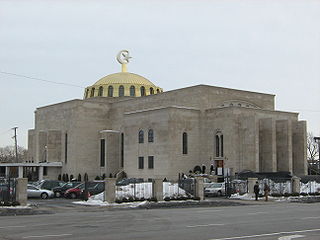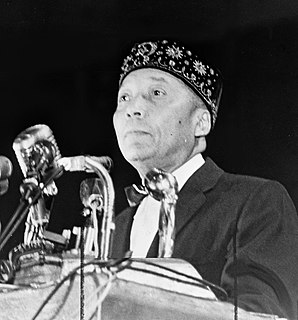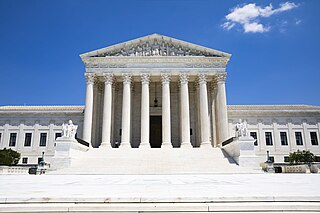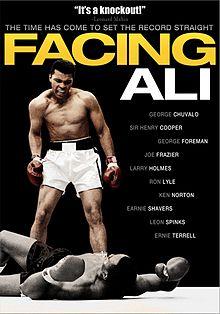
Malcolm X was an American Muslim minister and human rights activist who was a prominent figure during the civil rights movement. A spokesman for the Nation of Islam until 1964, he was a vocal advocate for Black empowerment and the promotion of Islam within the Black community. A posthumous autobiography, on which he collaborated with Alex Haley, was published in 1965.

The Nation of Islam (NOI) is a religious and political organization founded in the United States by Wallace Fard Muhammad in 1930. A black nationalist organization, the NOI focuses its attention on the African diaspora, especially on African Americans. While it identifies itself as promoting a form of Islam, its beliefs differ considerably from mainstream Islamic traditions. Scholars of religion characterise it as a new religious movement. It operates as a centralized and hierarchical organization.

Muhammad Ali was an American professional boxer and activist. Nicknamed "The Greatest", he is regarded as one of the most significant sports figures of the 20th century, and is frequently ranked as the greatest heavyweight boxer of all time. In 1999, he was named Sportsman of the Century by Sports Illustrated and the Sports Personality of the Century by the BBC.

A slave name is the personal name given by others to an enslaved person, or a name inherited from enslaved ancestors. The modern use of the term applies mostly to African Americans and Afro-Caribbeans who are descended from enslaved Africans who retain their name given to their ancestors by the enslavers.
“The slave master who owned us put his last name on us to denote that we were his property. So when you see a negro today who’s named Johnson, if you go back in his history you will find that his grandfather, or one of his forefathers, was owned by a white man who was named Johnson. My father didn’t know his last name. My father got his last name from his grandfather, and his grandfather got it from his grandfather, who got it from the slave master. The real names of our people were destroyed during slavery.”

A conscientious objector is an "individual who has claimed the right to refuse to perform military service" on the grounds of freedom of thought, conscience, or religion.

The Five-Percent Nation, sometimes referred to as the Nation of Gods and Earths (NGE/NOGE) or the Five Percenters, is a Black nationalist movement influenced by Islam that was founded in 1964 in the Harlem section of the borough of Manhattan, New York City, by Allah the Father, who was previously known as Clarence 13X and, before that, Clarence Edward Smith.

Wallace Dodd Fard, also known as Wallace Fard Muhammad or Master Fard Muhammad, was the founder of the Nation of Islam. He arrived in Detroit in 1930 with an obscure background and several aliases, and taught an idiosyncratic form of Islam to members of the city's black population. In 1934, he disappeared from public record, and Elijah Muhammad succeeded him as leader of the Nation of Islam.

Elijah Muhammad was an African American religious leader, black separatist, and self-proclaimed Messenger of Allah, who led the Nation of Islam (NOI) from 1934 until his death in 1975. Muhammad was also the teacher and mentor of Malcolm X, Louis Farrakhan, Muhammad Ali, and his own son, Warith Deen Mohammed.

Harlan Fiske Stone was an American attorney and jurist who served as an associate justice of the U.S. Supreme Court from 1925 to 1941 and then as the 12th chief justice of the United States from 1941 until his death in 1946. He also served as the U.S. Attorney General from 1924 to 1925 under President Calvin Coolidge, with whom he had attended Amherst College as a young man. His most famous dictum was: "Courts are not the only agency of government that must be assumed to have capacity to govern."

John Marshall Harlan was an American lawyer and jurist who served as an Associate Justice of the U.S. Supreme Court from 1955 to 1971. Harlan is usually called John Marshall Harlan II to distinguish him from his grandfather John Marshall Harlan, who served on the U.S. Supreme Court from 1877 to 1911.

In the beliefs of the Nation of Islam (NOI), Yakub was a black scientist who lived 6,600 years ago and began the creation of the white race/whites. He is said to have done this through a form of selective breeding which is referred to as "grafting", while he was living on the island of Patmos. The Nation of Islam's theology states that Yakub is the biblical Jacob.

Like many institutions that draw public interest, the Supreme Court of the United States has frequently been depicted in fiction, often in the form of legal drama. In some instances, real decisions rendered by real courts are dramatized, as in Gideon's Trumpet and the seminal trial in The People vs. Larry Flynt. Other depictions are purely fictional, but center on realistic issues that come before the court. Television series centered on dramatizing the happenings of the court have proven to be short-lived, and have tended to receive overall negative critical reaction. One reason that has been suggested is that the Supreme Count is a court of appeals, whereas most legal drama portrays trial courts. Appeals may appear "bookish" in contrast to the theatrical storytelling of trials, especially juries. Furthermore, American audiences are not very knowledgeable about or interested in the Supreme Court.
Walter Beach, III is a former American football player.

This article is about the beliefs and theology of the Nation of Islam.
Clay v. United States, 403 U.S. 698 (1971), was Muhammad Ali's appeal of his conviction in 1967 for refusing to report for induction into the United States military forces during the Vietnam War. His local draft board had rejected his application for conscientious objector classification. In a unanimous 8–0 ruling, the United States Supreme Court reversed the conviction that had been upheld by the Fifth Circuit.
Shabazz is the name of a black architect whose tribe founded the populations of Africa according to the doctrine of the Nation of Islam (NOI). It is similar to the Persian name Shahbaz.

Facing Ali is a 2009 documentary directed by Pete McCormack about Muhammad Ali as told from the perspectives of ten opponents he faced during his career: George Chuvalo, Sir Henry Cooper, George Foreman, "Smokin'" Joe Frazier, Larry Holmes, Ron Lyle, Ken Norton, Earnie Shavers, Leon Spinks and Ernie Terrell.
Black nationalism is a type of racial nationalism or pan-nationalism which espouses the belief that black people are a race, and which seeks to develop and maintain a black racial and national identity. Black nationalist activism revolves around the social, political, and economic empowerment of black communities and people, especially to resist their assimilation into white culture, and maintain a distinct black identity.

Muhammad Ali's Greatest Fight is a 2013 American television drama film about boxer Muhammad Ali's refusal to report for induction into the United States military during the Vietnam War, focusing on how the United States Supreme Court decided to rule in Ali's favor in the 1971 case of Clay v. United States. The film was directed by Stephen Frears, from a screenplay written by Shawn Slovo based on the 2000 book Muhammad Ali's Greatest Fight: Cassius Clay vs. the United States of America by Howard Bingham and Max Wallace. It premiered on HBO on October 5, 2013.
Chauncey Eskridge was an American attorney and judge. He provided legal counseling for activist Martin Luther King Jr., one of the leaders of the civil rights movement. He served on the legal team of world heavyweight boxing champion Muhammad Ali, and argued the Clay v. United States case in which the Supreme Court of the United States overturned Ali's conviction for refusing to serve in the United States Army during the Vietnam War.













